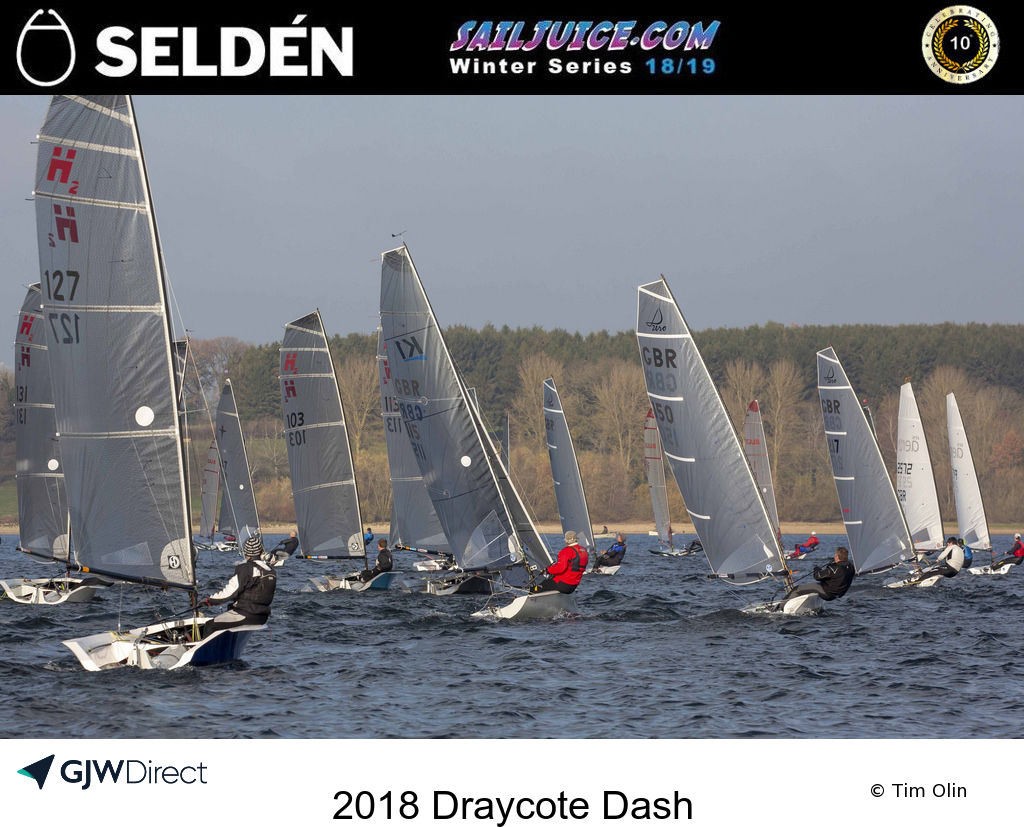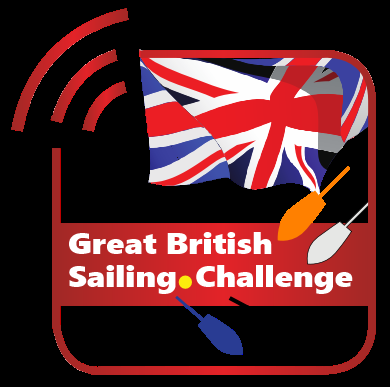Ben Schooling might have won round one of the Selden SailJuice Winter Series last weekend, but the Musto Skiff sailor was beaten into first place in his division of the Great British Sailing Challenge (GBSC). In the Fast Asymmetrics, it was the father and son duo from Ullswater Yacht Club, Colin and Oly Murray who won the gold medal in their Norfolk Punt, relegating Schooling to second place overall.
While the Selden SailJuice Winter Series is scored conventionally using the Great Lakes Handicap numbers, taking your best results from all races and discarding your worst, the GBSC scoring is done completely differently. Devised by Simon Lovesey of SailRacer who was running the GPS tracking at the weekend, the scoring for the GBSC relies on Dynamic Handicapping. “Perhaps the best way of describing it is as a ‘Flying Lap’, where we take each boat’s best single performance around the race course. Whereas normal PY handicapping such as the RYA or the Great Lakes is a measure of time on time, we’re taking a measure of time on distance. And whereas conventional results are based on your performance across the weekend, we’re taking your best performance in an individual race, a bit like your best lap when Formula One drivers are trying to qualify for pole position on the starting grid.”
This perhaps explains why Schooling was able to dominate the weekend with an outstandingly consistent performance - with the exception of his discarded result - while the other Musto Skiffs were unable to match the winner’s consistency. Andrew Stickland was 17th out of 111 boats, yet finished just one place behind Schooling in the Fast Asymmetric category of the GBSC scoring. His individual race performance was almost as good as Schooling’s.

Aside from the Murrays, other division winners were Roger Gilbert and Ben McGrane in the 505 (Fast Non-asymmetric), Jasper Barnham and Serena de Nahlik in the 2000 (Slow Asymmetric) and Tom Gillard (Slow Non-asymmetric). Top of the Youth category was Jamie Mason sailing a Laser Radial. While the term ‘Non-asymmetric’ is a bit of a mouthful, it’s currently the least worst way the GBSC organisers can think of for describing boats that sail straight angles downwind. Co-organiser Andy Rice commented: “The aim is to distinguish the two fundamentally different ways that boats sail downwind - the big gybing angles of the gennaker boats like the Musto Skiff and the 2000 for example, compared with the GP14s and 505s with symmetrical spinnakers which mostly sail more down the rhumb line downwind, along with the single-sailed singlehanders such as the Solos and Lasers.”
Aside from the headline story of the Murrays beating Ben Schooling, there many similarities between the results from the Selden SailJuice Winter Series and the GBSC ‘flying lap’ scoring. Lovesey attributes this to a couple of factors: “Firstly, Draycote produced some fairly consistent medium airs sailing on the weekend, which is why we saw the Great Lakes numbers produce 17 different classes in the top 20. Where the GBSC will start to look different from the standard results is when we’re looking at both extremes of the wind range. But the other thing to bear in mind is that in these early stages we have only limited data to work off, so the GBSC algorithm is pegged closely to the Great Lakes and the proven numbers in that system. As we gather more data and build more confidence in the new system, the numbers will start to reflect that more strongly.”
The next event in the Selden SailJuice Winter Series and the GBSC is the Datchet Flyer coming up on 8 & 9 December.
MEDAL WINNERS IN ROUND 1 OF THE GBSC (Draycote Water)
Fast Asymmetric
1 Colin MURRAY/ Oly MURRAY Norfolk Punt RMSC RNSA
2 Ben SCHOOLING Musto Skiff Helensburgh SC
3 Andrew STICKLAND Musto Skiff Thorpe Bay YC
Fast Non-Asymmetric
1 Roger GILBERT/ Ben MCGRANE 505 Netley SC
2 Peter GRAY/ Simon FORBES/Sam JONES National 18 Staunton Harold SC
3 Sam METTAM/ Tim SAUNDERS Fireball Papercourt SC
Slow Asymmetric
1 Jasper BARNHAM/ Serena DE NAHLIK 2000 Snettisham Beach SC
2 Simon HORSFIELD/ Katie BURRIDGE 2000 ASA
3 Stephen COCKERILL/ Sarah COCKERILL RS400 Stokes Bay SC
Slow Non-Asymmetric
1 Tom GILLARD Solo Sheffield Viking SC
2 Tim HAND Solo Swarkestone SC
3 Lawrence CREASER/ Maciek MATYJASZCZUK GP14 Hayling Island SC
Youth
1 Jamie MASON Laser Radial Blithfield SC
2 Abigail LARR Laser 4.7 Northampton SC
3 Lydia BARBER Laser Radial Blithfield SC
The dates for GBSC events already agreed are as follows:
Fernhurst Books Draycote Dash, Draycote Water Sailing Club
17 & 18 November 2018
Datchet Flyer, Datchet Water Sailing Club
8 & 9 December 2018
Brass Monkey, Yorkshire Dales Sailing Club
27 December 2018
Oxford Blue, Oxford Sailing Club
16 February 2019
King George Gallop, King George Sailing Club
16 & 17 March 2019
Derwent Dambuster, Derwent Reservoir Sailing Club
11 & 12 May 2019
The Bala Long Distance, Bala Sailing Club
22 & 23 June 2019
Mountbatten Centre, Plymouth
8 to 10 August 2019
The Ullswater Ultimate, Ullswater Yacht Club
17 & 18 August 2019
Grand Finals, Rutland Water Sailing Club
28 & 29 September 2019
Want your Club to host a GBSC event?
With these dates just announced, we’ve only just started. There are more in discussion and more yet to come. Contact Andy Rice at andy@sailjuice.com
How do I get to the Grand Finals?
The Grand Finals of the GBSC are designed to celebrate the best of everything in small-boat racing in Great Britain. So there are many ways to qualify....
Finish in the top 10 of the travellers’ series (based on your best three results)
Top qualifiers in a number of boat categories:
Fast Asymmetric
Fast Non-Asymmetric
Slow Asymmetric
Slow Non-Asymmetric
Multihull
Sportsboat
Best Improver
Most attended
Any boat valued at less than £1000
Top qualifiers in a number of age and other categories, for example:
Youth (Under 19)
Master (Over 60)
Female
Two Generations (two people sailing together, minimum age gap of 18 years - could be parent/child but not necessarily)
There will also be a number of ‘wild card’ invites available based on various criteria.
Hang on, but what even IS the Great British Sailing Challenge?
It’s a series of handicap racing events that take place throughout the year, and it’s open to pretty much any sail-powered craft. The Challenge will involve events throughout the whole year, with the target of around 100 boats taking part in each event on larger waters, and running events close to capacity on smaller lakes and reservoirs. Competing sailors will earn ranking points from each event they compete in, with the top 100 sailors invited to a winner-takes-all-final in Autumn 2019 to award the best sailors of the year.
Who came up with the idea?
The idea comes from the organisers of the Seldén SailJuice Winter Series which has been one of the big success stories of the past decade. Organised by Andy Rice of SailJuice.com (sailing journalist and marketer) and Simon Lovesey of SailRacer (event organiser and GPS tracking expert) is about to enter its 10th season and this year is sponsored by mast maker Seldén. If you’re familiar with the SailJuice Winter Series, then this will give you an idea of what’s on offer, except with a few key differences.....
All Year Round
The Seldén SailJuice Winter Series takes place in the cold months. The GBSC takes place throughout the year and will incorporate some of the events in the Seldén SailJuice Winter Series as well as a number of other existing events, along with some brand new ones too.
Great Lakes and Dynamic Handicapping
One of the key reasons for the success of the SailJuice Winter Series is the introduction of the Great Lakes handicap numbers, a refined version of the standard RYA PY numbers. We’re taking the proven formula of the Great Lakes numbers for the jump-off point for the Great British Sailing Challenge, and then we’re using GPS trackers on the competing boats to start analysing the numbers in greater detail. We call this ‘Dynamic Handicapping’. Whereas the numbers in the Great Lakes are analysed and altered once a year, GPS-based Dynamic Handicapping enables much faster and more frequent analysis of the relative performance of different types of boat. Like Strava, the mobile app which has revolutionised the cycling world, or Park Run and what it has done to popularise running, the organisers are taking a ‘Big Data’ approach to the sailing world.
Over time, this will make it possible to produce accurate handicaps for:
- different wind strengths
- older, less competitive boats
- sailors of different abilities, from virtual beginners to world-class athletes.
The sailing calendar’s already busy, do we really need more events?
It’s true, we’ve got loads of sailing events taking place almost every weekend of the year, especially during the summer months. But the majority of those events are not very well attended, especially some of the single-class open meetings where some of the less popular classes sometimes struggle to attract more than 10 boats. We don’t think that’s a sustainable way of running an event, either from the class’s point of view, or the club’s. With a multiclass approach to open meetings, we can create the scale for events that are more fun, and that a club really wants to host.

